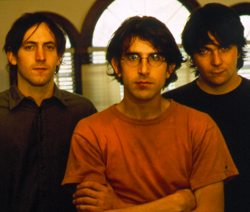Groop Dogdrill
"Half Nelson"
(Beggars Banquet)
 Name-checking Americana is popping up on more and more records—everyone's
got a song about Elvis or at least a few "Thank you verra much"-es.
Or they talk up bourbon or V-8 engines, not to mention the mushmouthed,
semi-Southern drawl that has become de rigueur elocution
for every East Village rocker. Groop Dogdrill is laden with
these references, despite the fact that they're from England
(Northern England, no less). "Half Nelson" features a song each
for Elvis Presley, Jackie Onassis, and the Rat Pack, as well
as one where the chorus consists of screaming, "White trash!
White trash!" over and over. Even the band's sound seems, at
first, to be pure America too—the good old-fashioned power
trio, complete with guy-who-wears-his-bass-around-his-knees,
that made the midwest (Big Black, Minutemen, Husker Du) mighty
for much of the '80s before heading further west. And they've
got that punk-blues thing everyone's up to these days.
Name-checking Americana is popping up on more and more records—everyone's
got a song about Elvis or at least a few "Thank you verra much"-es.
Or they talk up bourbon or V-8 engines, not to mention the mushmouthed,
semi-Southern drawl that has become de rigueur elocution
for every East Village rocker. Groop Dogdrill is laden with
these references, despite the fact that they're from England
(Northern England, no less). "Half Nelson" features a song each
for Elvis Presley, Jackie Onassis, and the Rat Pack, as well
as one where the chorus consists of screaming, "White trash!
White trash!" over and over. Even the band's sound seems, at
first, to be pure America too—the good old-fashioned power
trio, complete with guy-who-wears-his-bass-around-his-knees,
that made the midwest (Big Black, Minutemen, Husker Du) mighty
for much of the '80s before heading further west. And they've
got that punk-blues thing everyone's up to these days.
But,
despite the fact that it's about as far from Britpop as you
can run with your ass on fire, Groop Dogdrill is obviously
an English band—and not simply because the singer can't
quite hide that Mark E. Smith accent. After all, the original
model for the way-too-noisy-to-be-just-three-guys unit would
be Motorhead; and the album's closer, the zodiac-dropping,
groaning 'n' yelping trash anthem, "Silver Boots," has the
low-end grind that's distinctive to Lemmy and his crew, punctuated
with guitar squalls that screech like a faulty engine rounding
that last curve on the speedway. "Salt Peter" rattles and
squeals like a punk rocker's D.T.'s, but it also alternates
cymbal-backed brooding with guitar maelstrom and agonized
falsetto shrieks in the grand heavy metal tradition; there's
a lot of metal on this album, and not the foolish rap-flavored
kind they manufacture stateside, but the real stuff, the kind
they make knives out of. Multiple props to the rhythm section,
which encircles every song with a tight, ominous beat, then
busts 'em open like hired thugs through a picket line—as
on "Gracelands," in which the obsessive sound underlines the
King's spluttering fantasies about guns and killing someone
and guns and bullets, and guns, and—well, you get the
picture. A punk's version of heavy metal and a Brit's take
on America, Groop Dogdrill may holler about the filling station
on route 66, but they're still selling "petrol." —Lissa
Townsend Rodgers
 Sebadoh
Sebadoh
"The Sebadoh"
(Sub Pop)
 As Sebadoh takes its first steps into its second decade as a
band, one would expect the group to keep to the road paved by
1996's "Harmacy"; a quieter, more subtle road that one tends
to walk once entering their 30s. That's one of the many surprises
that you find once you place "The Sebadoh" on your turntable
(or CD changer) and set it in motion. This is a band that suddenly
sounds young and full of energy, not ready to tread the middle
ground, but still ready to smash its head on the punk rock.
As Sebadoh takes its first steps into its second decade as a
band, one would expect the group to keep to the road paved by
1996's "Harmacy"; a quieter, more subtle road that one tends
to walk once entering their 30s. That's one of the many surprises
that you find once you place "The Sebadoh" on your turntable
(or CD changer) and set it in motion. This is a band that suddenly
sounds young and full of energy, not ready to tread the middle
ground, but still ready to smash its head on the punk rock.
There are two aspects to this record that will suck in the
listener's attention. First is the fact that, while "Harmacy"
was more of a "Lou Barlow" record, "The Sebadoh" has the feel
of a more collective effort. This is strongly underlined by
the growth of Jason Loewenstein as a songwriter. Usually he
comes across as the color man—ready to take your mind
off of Barlow's darker emotions as you make your way through
a Sebadoh record—lightening the mood with his punk-ish
screaming and insane chord structures. This time out he stands
as an equal, not only contributing eight of the 15 songs,
but creating such as "Decide" and "Thrive"—two standouts
on a record full of strong tunes.
The other notable feature of this record is the change in Barlow's mood. While increasingly somber and introspective of late, he suddenly does an about-face and creates some of this records most rocking moments. Just try to get "Flame" out of your head once you hear it. No way, you're doomed to find it humming along in your head long after you have left the record behind and gone on about your day. "Tree" is also another Barlow standout, with its acoustic strum and vocal harmony, and while "Colorblind" is a little obvious, you just gotta love hearing Lou scream out, "Crackers in their camouflage, heading for the hills!"—Christopher Anderson
 Send feedback here.
Send feedback here.
|
